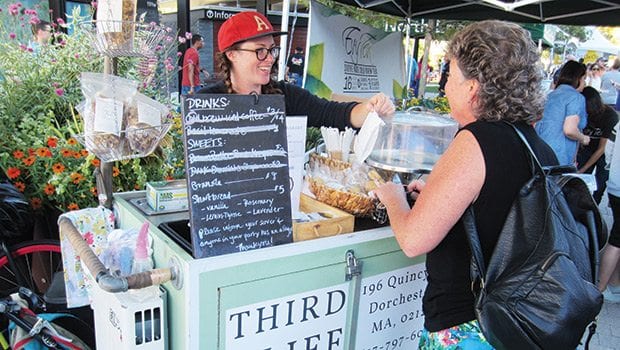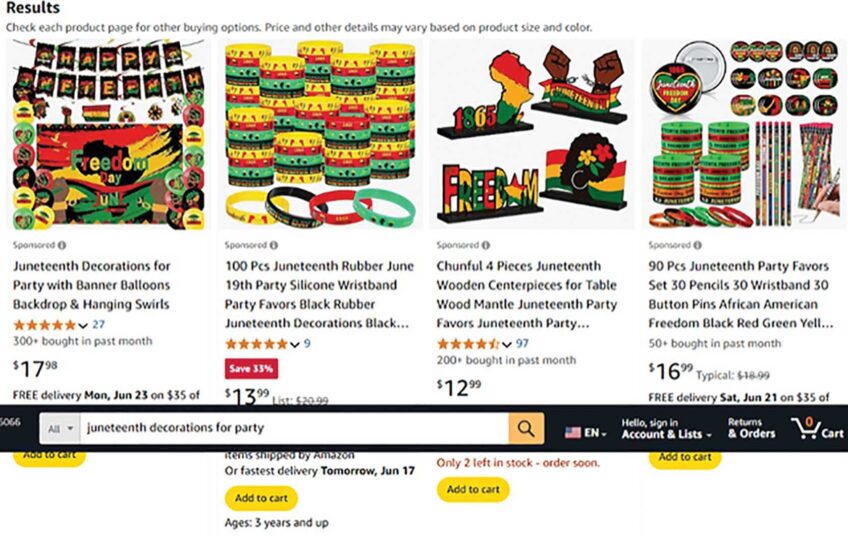Focus on sustainable food
Festival highlights progress in Boston’s local food economy

Owners of many of Boston’s up-and-coming new food businesses turned up to showcase their fare on Sept. 20 for the sixth annual Boston Local Food Festival on the Rose F. Kennedy Greenway. Neighborhood food startups relished the attention from an estimated 50,000 visitors who roamed and grazed through the food festival’s array of stalls and tents.
Many also saw a great way to connect with the growing sustainable food movement.
The festival, which featured farmers, local restaurants, food trucks, specialty food producers and organizations that focus on healthy food, was organized by the Sustainable Business Network of Massachusetts. The Cambridge-based organization, formed more than 25 years ago, links together companies that have helped define what it means to be a sustainable business, in an effort to build a stronger local economy through a network of environmentally and socially conscious businesses.
In the food industry, sustainability means an emphasis on using and buying locally grown products, support of local companies selling or cooking these foods and fair wages and trade practices that benefit the local economy.
Food festival attendees were able to soak up the sun on a beautiful fall day along with the sights and smells of some of the region’s best local food, and the event gave off a clear impression that the region can support and thrive with a sustainable local food economy.
The food festival also helps the Sustainable Business Network and Food Solutions New England push their “50 by 60” food vision for the region. Backed by a 2014 report, “A New England Food Vision,” the vision calls for New England to build the capacity for healthy food for all its residents, sustainable farming and fishing, and thriving local food businesses, while producing 50 percent of the region’s food by 2060. The report proposes changes in food production, distribution and consumption in order to achieve this goal.
Many of the small food businesses at the Boston Local Food Festival are already leading the charge.
Dorchester-based food startup incubator CommonWealth Kitchen was well-represented, with many of the businesses that use its Dorchester and Jamaica Plain kitchen facilities filling display tables at the festival.
One such business was Third Cliff Bakery, which parked its “food trike,” a portable selling unit pushed by a bicycle, along one corner of the pathway on the Kennedy Greenway. Owner Meg Crowley said the event was the largest she had attended, and that she was thrilled to get so many new people to try Third Cliff Bakery’s shortbread cookies and baked goods.
She said sustainability and the local food economy were foremost on her mind in starting her one-year-old business.
“One of the reasons I decided to do a food trike versus a food truck was because it has a smaller footprint,” she said.
Crowley also noted she makes a point to use all local ingredients in her baked goods and supports any efforts to help other small local food businesses do the same.
Hyde Park resident Tia Jackson seemed to be a hit with the foodie crowd, showcasing the mouthwatering goods of Tia’s Cakes & Pastries.
Jackson has been baking up goods for several years now, but recently moved her operations into CommonWealth Kitchen and now focuses on her business full time.
She uses some local ingredients in her baking, she said, and welcomed the opportunity to become more part of the local food movement.

R&S Jamaican restaurant at the festival.
“I definitely have thought about sustainable products, just because I want to use more local vendors, so as I continue to expand, that is the plan,” Jackson said. “It is a challenge, so that is why this is a good step into it.”
Jackson also stressed the value of the exposure from participating in the food festival.
“This is part of my marketing plan. I like to get out and meet the people in Boston,” she said.
Blonde Beauchamp, owner of The Craic & Blonde, which makes Haitian Relish Hot Sauce that is a spin on the traditional Haitian condiment pikliz, was likewise thrilled by the exposure.
“I get to meet new customers. I get to meet people who don’t know about this,” said Beauchamp who also runs her business out of CommonWealth Kitchen. “This is a traditional Haitian food and a lot of people don’t know about Haitian food or culture. This is really a great way to get that in front of their faces, to get them to try it. As a small business and a new business — I am one year in — this is a nice way to raise the profile.”
The Craic & Blonde uses local produce when it can, according to Beauchamp. However, at this point, she cannot buy one of her main ingredients — habanero peppers — locally year-round, though she hopes this will change.
“With urban farming growing in the city here, I am hoping I will be able to do something more around the peppers,” Beauchamp said. “It is important to me.”
Joanne Burke, an author of the “A New England Food Vision” report and a professor of sustainable food systems at the University of New Hampshire, stressed the importance of the food festival in spreading the message of “50 by 60.”
“The nice thing about a food festival is you get people here that are enjoying the flavor and the culture, which are all part of securing the food future, but you are also providing education,” Burke said. “All of a sudden people become aware of the fact that there is this New England movement that we can do better together. It really does make the seriousness of the future of food more visible.”
Burke also stressed that the participation of small businesses in the New England Food Vision is critical and that she was thrilled to see so many out in support of the local food economy.
“Small business represents so many ways in which communities can align around healthy foods,” she said. “It represents economic opportunity. It represents jobs. It also means that those small businesses have to look and ask, ‘What are we doing about fair and equitable wages?’”
Boston’s neighborhoods were well represented at the festival, with businesses sprinkled throughout the length of the food festival area. R&S Jamaican Restaurant in Dorchester drew long lines throughout the day for its spicy jerk fair; vegan ice cream company FoMu out of Jamaica Plain seemed to never stop serving scoops to customer after customer; and three of the five food trucks parked at the festival were from the city: Fresh Food Generation, Singh’s Roti and Uyghur Kitchen.






